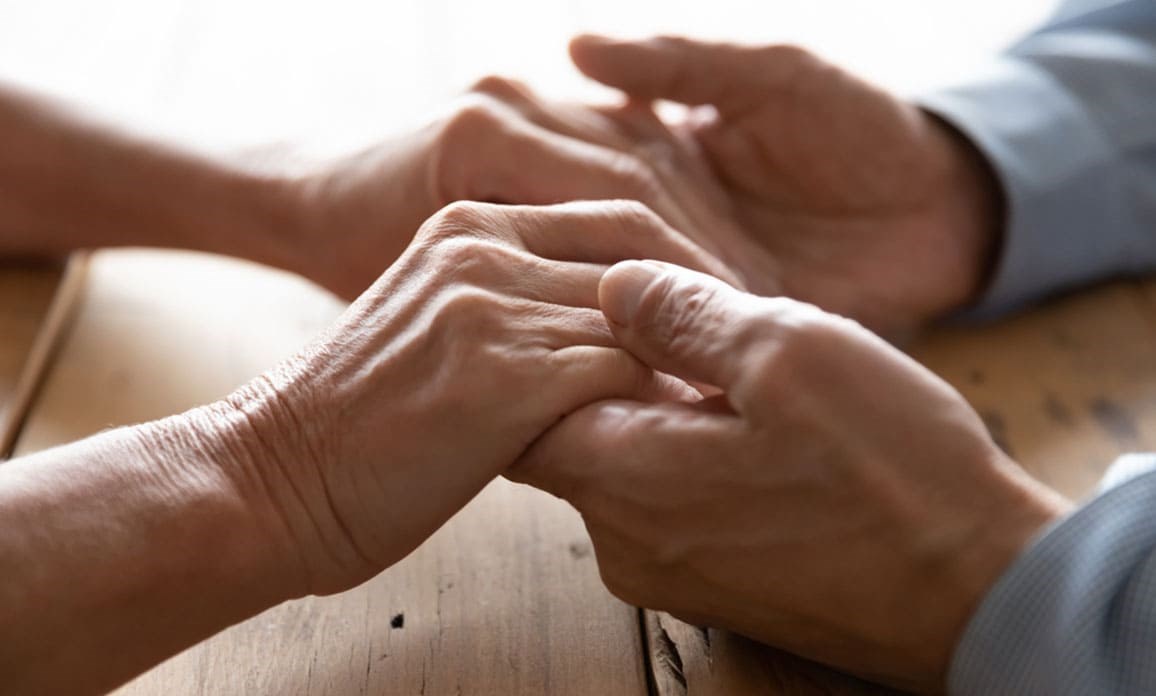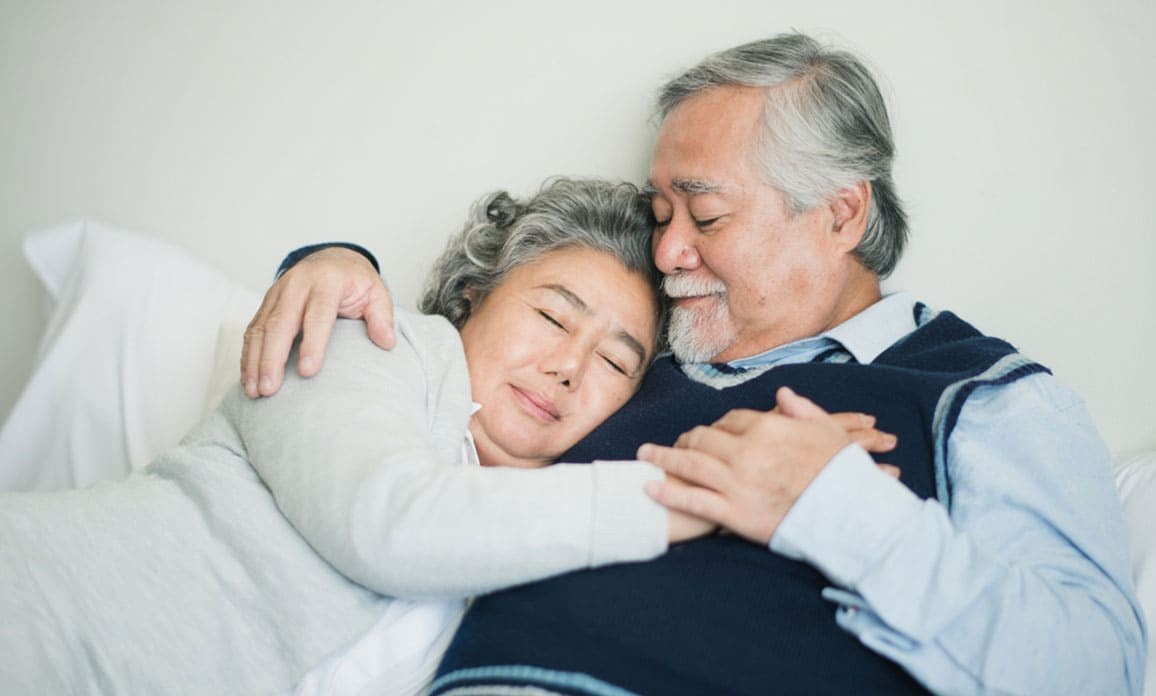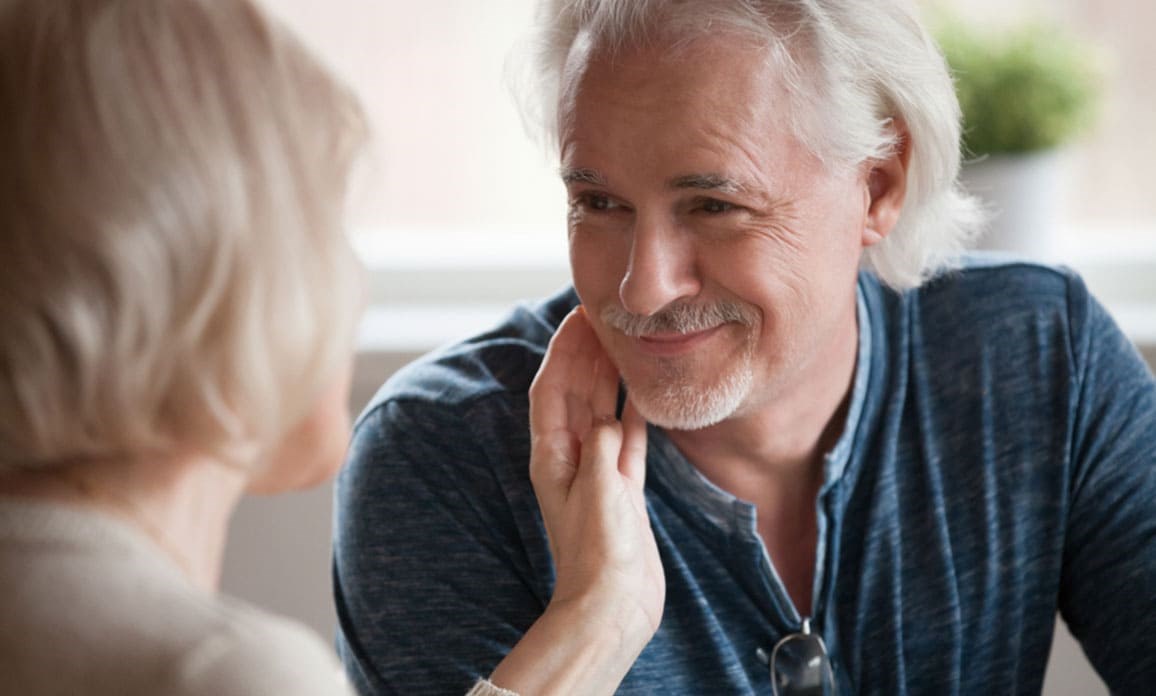Sexuality and Parkinson’s – What’s the connection?
Sexuality is an essential feature in human life from birth to old age. It is much more than the sum of erotic experiences or sex acts, nor does it start and end with intercourse.
In fact, people typically experience three major aspects of sexuality, though not necessarily all always at the same time:
- Touch – the physical aspect of sexuality
- Love and affection – the emotional aspect of sexuality
- Closeness – the intimate aspect of sexuality, be it physical or emotional closeness.
Interestingly, these three aspects come into play both in an erotic context and in a non-erotic context. For example, hugging a baby, kissing a partner, holding hands or embracing a friend are some of the many types of non-erotic touch. Such types of touching may reduce stress, increase feelings of security, and make us feel welcomed and loved. This kind of non-erotic sexuality is essential for our well-being. In contrast, people sometimes wish to experience the physical aspect of sex by enjoying their sensual and erotic sexuality. They will touch their partners (or themselves) to produce sexual excitement and reach orgasm.

Similarly, the emotional aspect of sexuality may include affection and love of family members and friends, but it can also be experienced through emotional attraction, sexual desire, and erotic excitement.
The World Health Organization (WHO) has recognized the importance of sexuality, stating the following: “Sexual health is fundamental to the overall health and well-being of individuals, couples and families, and to the social and economic development of communities and countries. Sexual health, when viewed affirmatively, requires a positive and respectful approach to sexuality and sexual relationships, as well as the possibility of having pleasurable and safe sexual experiences, free of coercion, discrimination and violence” (source: https://www.who.int/health-topics/sexual-health#tab=tab_1)
Sexuality and sexual health are just as important for people with Parkinson’s disease (PD). Sexuality and sexual health have a beneficial effect on physical and mental health, and they contribute to the people's well-being and quality of life whether or not they have a chronic and progressive disease like PD.

What is the connection between sexuality and PD?
PD is a multidimensional progressive disease that produces various motor symptoms (e.g., bradykinesia, rigidity, tremor) and non-motor symptoms (e.g., depression, anxiety, fatigue, pain, sleep disorders, bladder, and bowel disturbances).
Sexual functioning is also a multidimensional process that requires the body’s autonomic, sensory, and motor systems to work together in harmony. This process depends on the proper functioning of the vascular, endocrine, and neurological systems. The motor and non-motor symptoms of PD may have a significant adverse impact on these systems, thus affecting the physical, emotional and intimate aspects of sexuality in people with Parkinson’s. In particular,
- Tremor and impaired fine motor skills may make it difficult to touch and caress your partner.
- Speech impairment may hamper communication with a partner, sharing feelings, or expressing love.
- Rigidity as well as tremor may disturb sexual stimulation of a partner, as well as self-stimulation.
- Slowness in movements may cause problems in changing positions during intimate activities.
- Instability can prevent you from keeping your sexual position or maintaining rhythmic movements needed for stimulation.
- Problems with concentration can prevent you from staying stimulated long enough to reach orgasm.
Tiredness, apathy, pain, and depression may induce arousal disorders (erectile dysfunction, vaginal dryness and pain) and decrease libido.
Sexual misconceptions
We grow up thinking that sexuality and intimacy are innate features of humanity, that they come to us naturally or should be left ungoverned and that if things don’t go smoothly on their own – then there must be something wrong with us. These misconceptions keep sex therapists in business.
The truth is that many people – regardless of their general health – may benefit from a hefty dose of sexual planning. Preparing for an intimate situation, either physically or mentally, making arrangements to help improve our experience or make us more comfortable, and using different props and accessories may all contribute to a healthier, happier sex life.
This is doubly true in the case of people with neurological conditions such as Parkinson’s. The motor symptoms affecting people with PD make many aspects of life a lot less spontaneous – and their sex life is no exception. Just like a patient with PD may need to plan simple actions, such as standing up, so too they may need to plan how to execute the rhythmic movements often involved in intercourse. True, this means that intimacy may become less spontaneous, however it is a small price to pay if we stand to gain a healthier sex life.
How people with PD manage their sexuality
In my practice I often see PD patients who are struggling to reconcile their sexual needs with the way PD is affecting their motor and cognitive functions. My role as a sex therapist is to help them find a way to maintain a healthy sexuality, with or without their significant other.
Since rigidity is a common symptom of Parkinson’s, many patients complain that they are no longer able to touch their partner as softly as they used to. This may result in a lot of frustration for both partners, to the point that they might avoid sexual contact altogether. To address this, patients may use different elements and accessories to help soften their touch – from oil and other lubricants to a soft, fluffy glove that can produce a softer touch.
Some patients suffer from urinary incontinence, which may be embarrassing and a “turn-off” in intimate situations. Incontinence is a common symptom in many other conditions also, from multiple sclerosis to menopause. It can be managed with adequate preparation: patients avoid drinking about two hours prior to having sex, avoid common diuretics including caffeinated drinks, go to the bathroom before having sex, and have a towel nearby in case of an accident.
Many patients suffer from tremor that may even worsen as they get excited in anticipation of sexual contact. Interestingly, some partners find this tremor exciting as it may allow them to discover new intimate sensations; however, those who wish to mitigate the effect tremor has on their sexual contact may pick one of two strategies. One involves controlling their tremor by timing their medication and intimate times accordingly. The other involves using props – such as a soft brush or plush glove – to reduce the intensity of the tremor that is transferred to their partner’s body.
PD patients may also struggle with concentration – some to the degree that they are unable to stay focused long enough to reach orgasm. This is true even for patients with no sexual partners who engage in auto-stimulation or masturbation. For some people, listening to a specific type of music or watching a romantic movie helps maintain concentration. Other solutions to consider include occupational therapy, meditation and even designated mobile-phone apps.
As with many issues involved in Parkinson’s Disease, a multidisciplinary approach may be required. PD patients suffering from generalized symptoms may also find their sexuality affected, and those symptoms should be addressed as part of their journey toward a healthier sex life. Symptoms such as depression, chronic pain, and fatigue should be treated with the help of appropriate health care providers; once addressed, they may become less of an impediment to intimacy.

Addressing sexuality as part of a holistic approach to PD
While patients typically discuss many PD symptoms with their health care team, their sexuality is often left out of the doctor’s office. Yet given the importance of sexuality to health in general, and to the health of those living with PD in particular, it is important to talk openly about your intimate problems, so you can continue to derive the strength that you need and deserve from supportive and healthy human connections.
As a sex therapist who specializes in sexual rehabilitation of people who live with neurological disorders, I deeply believe that it is your basic right to touch and be touched, to love and be loved and to remain a sexual human being throughout your entire life.
Key Messages
- Sexuality and intimacy contribute to our wellness and quality of life.
- Parkinson’s is not a reason to stop touching, hugging, or loving.
- People with Parkinson’s remain human sexual beings.
- Talk openly about your intimate problems with your health care providers.
THIS ARTICLE DOES NOT PROVIDE MEDICAL ADVICE and is not a substitute for professional medical advice, diagnosis or treatment. If you or any other person has a medical concern, you should consult with your health care provider or seek other professional medical treatment immediately. Never disregard professional medical advice or delay in seeking it because of something that you have read on this website or in any linked article, blog or other materials.








